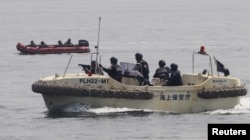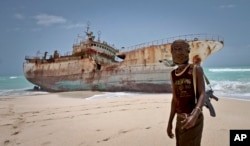A "remarkable" decline in maritime piracy in Southeast Asia has been recorded for the first quarter of this year; however, attacks have significantly escalated in the northernmost part of the tropical Atlantic Ocean, off the coast of Africa.
During the first three months of the year, only 13 maritime crime cases were reported in Southeast Asia, compared to 35 for the same period last year, according to a global report by Dryad Maritime, released early Tuesday in London.
It is the lowest number recorded in 10 years by Dryad, which provides information and analysis on attacks and incidents.
"Primarily, we believe that this is because the criminal gangs have come under a lot of pressure. They've been subject to a proactive effort in law enforcement and also in deterrence," said the consultancy's chief operating officer, Ian Millen.
"This is quite a remarkable turnaround in a little over six months and it's a testament to those who have been involved in combating the crime," Millen told VOA. "The Australians have been involved in assisting the region with some of these issues. If you look at countries in particular — Malaysia, Indonesia, Bangladesh — we see more effective patrolling by these countries, which has helped with the situation, of course."
Recent incidents
So far, Jakarta is the only Southeast Asian port where more than one incident has been reported this year.
The region's most serious recent incident has been the hijack of a tug and barge carrying coal from Indonesia to the Philippines. The tug was ransacked, the tow abandoned and ten crew members kidnapped. The Abu Sayyaf group has issued a $1 million ransom demand.
The Philippine military says 18 of its soldiers were killed and more than 50 others were wounded Saturday in Basilan province during a 10-hour firefight with extremists of Abu Sayyaf, an Islamic State ally.
Gulf of Guinea, an upswing
In the Gulf of Guinea, the north-easternmost part of the tropical Atlantic Ocean, there has been an upswing in maritime piracy, in stark contrast to the trend in Southeast Asia.
Attacks against oil pipelines and facilities ashore around the Niger Delta have escalated there, "deterring major international companies from investing in the region for fear of suffering huge financial and logistical losses," according to the Dryad report.
"It's simple, it's effective, it's profitable and it's low risk,” Millen told VOA. "The pirates there are even doing this in the daylight now, and they operate with almost impunity."
There have been 14 attacks on commercial vessels off Nigeria's Rivers and Bayelsa states. However, eight of the raids were thwarted by crews taking evasive maneuvers. But in the six which succeeded, a total of 23 crewmembers were kidnapped for ransom.
"European and American seafarers remain the most lucrative kidnap and ransom target," according to the Dryad report.
"In the Gulf of Guinea, the worrying trend is that we will probably see a lot more [kidnappings]. The good news is that we will probably see a lot less of product tanker hijack," Millen predicted.
Nigeria's navy has not been very responsive and lacks the effectiveness to confront the pirates, according to analysts.
Activity elsewhere
Another significant development is that there has not been an attack on a commercial vessel by Somali pirates in more than two years, according to Oceans Beyond Piracy, an independent non-profit organization established to develop a response to maritime piracy.
Maritime crime throughout the rest of the world continues to decline, with just 15 incidents reported to Dryad in the first quarter of the year. The majority of these case — eight incidents — have been attacks on yachts in the Caribbean.
Notably, there have been no instances of piracy in the Indian Ocean High Risk Area during the first quarter of 2016, but reports of suspicious craft in the Gulf of Aden persist.













